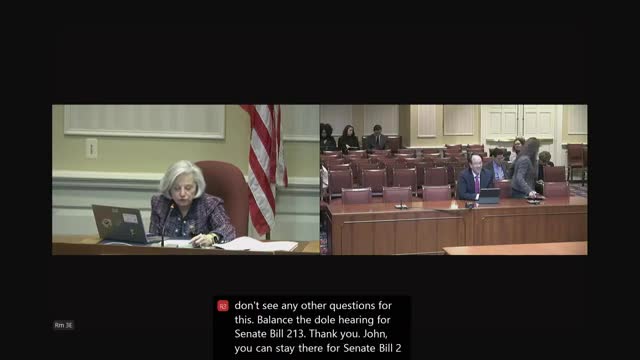HSCRC seeks removal of sunset on hospital user-fee assessment to sustain analytic work (Senate Bill 229)
Get AI-powered insights, summaries, and transcripts
Subscribe
Summary
HSCRC Executive Director John Kromm told the Senate Finance Committee that repealing the sunset on the hospital user-fee assessment is necessary to prevent an operating shortfall and support expanded policy and analytic work under Maryland’s AHEAD model.
John Kromm, executive director of the Health Services Cost Review Commission, testified Jan. 15 that Senate Bill 229 is necessary to remove the sunset on the commission’s hospital user-fee assessment and preserve its ability to carry out expanded responsibilities under Maryland’s health-model reforms.
Why it matters: HSCRC is funded entirely through a user fee assessment on hospitals, capped by statute at 0.1% of the prior fiscal year’s regulated hospital revenue, Kromm testified. That funding formula has been in place with a sunset; if it lapses, HSCRC’s operating budget would be limited to approximately $20 million in fiscal 2026, Kromm said, creating an immediate shortfall in the agency’s ability to perform rate-setting, analytic work and new tasks associated with the state’s AHEAD model.
Witness testimony and responsibilities: Kromm told the committee HSCRC’s workload has expanded since 2019 from hospital rate regulation to broader affordability, quality and population-health analyses and that the commission has new statutory and stakeholder-directed tasks including work on emergency department wait times, medical debt, trauma funding and hospital facility fees. He said the user-fee cap is modest relative to hospitals’ overall budgets, and the formula allows adjustments downward when less funding is needed.
Committee concerns and stakeholder views: Senator Lam and others questioned why the removal should proceed before stakeholders receive fuller information about the AHEAD agreement with federal partners. Lam suggested a shorter extension or additional stakeholder consultation; Kromm said a two-year extension would not provide sufficient time horizon for recruiting staff and contracting for the analytic work HSCRC expects to undertake. The Maryland Hospital Association submitted written testimony supporting SB 229 “with amendments,” and senators urged additional conversations with hospital stakeholders before final committee action.
Closing: Kromm asked for a favorable report to ensure predictable funding and to allow the commission to implement AHEAD-related duties. No formal votes were recorded in the transcript for SB 229 during this hearing.
